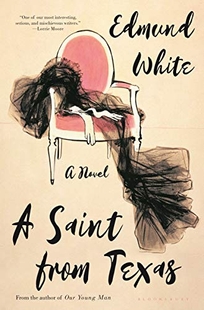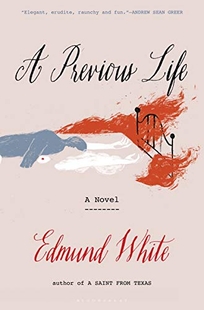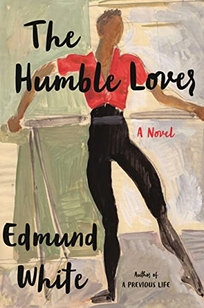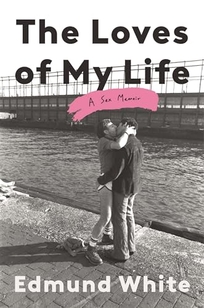Edmund White has received many moving tributes for his candid—and sexually explicit—depictions of gay lives in his novels, memoirs, and literary biographies since he died last week at 85. Often, the tributes have have come from younger writers such as Édouard Louis, who found the freedom to write about their own lives from White’s trailblazing example.
I’ll offer that White’s example as a critic was deeply important to me. From hearing him speak on panels and reading his long and intrepid reviews in the New York Review of Books, in which he exhibited his voracious appetite for reading, I quickly became possessed with the desire to read everything. Thanks to his little volume on Proust, and the way he celebrated the sheer pleasure found in the best prose (as in his praising of an uneven Martin Amis novel), I took years out of my 20s to slowly read In Search of Lost Time. It was a special treat when he agreed in 2020 to review Robert Jones, Jr.’s debut novel The Prophets for me, as part of PW’s occasional signature review program.
White’s continuous engagement with literature must have had something to do with the consistently high quality of his prolific output, which culminated in a remarkable late-career run of four excellent books in the past five years. Below are PW’s original reviews, all of them starred.
We will greatly miss Edmund White’s glorious books and generous criticism. If you’re new to White’s work, one exciting thing is that you can work your way backwards without missing any of his greatness.

Edmund White. Bloomsbury, $26 (304p) ISBN 978-1-63557-255-1
White (
The Unpunished Vice) serves up a mesmerizing sensual history of identical twin sisters who leave their booming Texas oil town for Paris and a Colombian convent. As teens in 1950s Ranger, Tex., Yvonne and Yvette Crawford are as different as can be. Yvonne listens to top-10 radio hits, reads women’s magazines, and aspires to French aristocracy and a career in fashion; Yvette, with a “crush on God,” prefers Bach and performing acts of charity. Both are determined to escape their small-minded, oil-rich abusive father and social climbing stepmother. Most of the retrospective narrative comes from Yvonne’s point of view, focusing on her sumptuous experience in Paris, where she travels for her college junior year abroad and instantly immerses herself in haute couture. Surrounded by a plenitude of Givenchy and marrons glaces, Yvonne soon marries Adhéaume de Courcy, whom she characterizes as a “spendthrift, unloving, snobbish popinjay.” The marriage contract is simple: his title for her money. Meanwhile, Yvette’s success as a miracle-working nun in Jericó, Colombia, is revealed in a series of letters sprinkled throughout, which include details of Yvette’s amorous friendship with a fellow nun. Yvonne is also romantically interested in women, and White elevates his delicious descriptions of Yvonne’s lecherous thoughts about a sorority sister with notes of Yvonne’s mature self-awareness. Bombshell revelations abound when the narrative reaches its boiling point, which White handles with aplomb. Equally tender and salacious, White’s deeply satisfying character study demonstrates his profound abilities.
Agent: Peter Straus, RCW Literary Agency. (Aug.) 
Edmund White. Bloomsbury, $26 (288p) ISBN 978-1-63557-727-3
White (
A Saint from Texas) offers an erotically charged and ingenious metafictional story of a married couple. In 2050, 70-something Sicilian musician Ruggero Castelnuovo agrees, with his 30-year-old American wife, Constance, to break the silence about their pasts. Three decades earlier, Ruggero had an affair with Edmund White, who was in his 80s at the time. Ruggero and Constance read their memoirs aloud in alternate passages, and each welcomes their newfound revelations. Ruggero fears that despite his international reputation in the music world he’ll only be remembered as “the man who ruined Edmund White’s life” (what he means by that will come out later). Constance tells of a gay suitemate at Princeton, two failed marriages to older men (robbed by her first husband; humiliated by her second). As their confessions unroll, they reckon with the shadow of age and redefine their relationship, culminating in life-changing decisions. Through it all, the author hands his characters indelible lines to express their self-knowledge, which often yield insights on gender fluidity and sexuality (“it was the part you played that determined your identity, not the gender of your partner,” Ruggero tells Constance, explaining an episode of role play). It adds up to a dizzyingly enticing and kaleidoscopic take on the spectrum of sexual experiences.
(Jan.) 
Edmund White. Bloomsbury, $27.99 (272p) ISBN 978-1-63973-088-9
In White’s audacious latest (after
A Previous Life), wealthy Manhattanite Aldwych West pursues the younger August Dupond, principal dancer for the New York City Ballet. The 80-year-old’s aching desire for the 20-year-old enfant terrible leads to a live-in relationship that upends each of their lives. August prefers Gatorade to champagne, brings home other lovers, and engages in hardcore BDSM with his partners. Aldwych, meanwhile, hatches a plan to win August’s affections that involves launching a new ballet company, which would allow August to fulfill his creative potential. Philanthropic investment banker Bryce gets involved with the project, and Bryce’s dominatrix wife, Ernestine, arranges for an “afternoon of pleasure and pain” with herself, August, and a sex worker. As the sexual paths of these “perfidious lovers” continue to cross, Aldwych stumbles through his increasingly quixotic endeavor, and White brings it all together in a shocking and baroque conclusion. As ever, White is a master of social comedy and wry observations (on the source of Aldwych’s wealth: “His family had invented the microwave, or maybe something older, like the kitchen stove”). Explicit descriptions of August’s sex life, meanwhile, not only titillate but add poignancy to the portrayal of Aldwych’s elusive desire. Readers will delight in this immersion into a lurid world of passion.
Agent: Bill Clegg, Clegg Agency. (May) 
Edmund White. Bloomsbury, $27.99 (256p) ISBN 978-1-63973-372-9
With his trademark irreverence, White (
The Humble Lover) celebrates more than six decades of sex in a candid memoir that doubles as an indispensable work of queer history. A “practicing gay” since age 13, White, now in his 80s, catalogs sexual encounters spanning from pre-Stonewall America to the dawn of online dating. White’s partners include hustlers in 1950s Cincinnati, boarding school classmates, a smattering of women intended to “cure” his homosexuality, and a much younger Spaniard he met on the internet and spent a summer with. White has no time for prudes; his prose is redolent with the funk and flavor of male bodies, describing one straight lover—a wrestler—as “deliciously under-washed.” There is so much sex, in fact, that the proceedings occasionally threaten to become monotonous, but White saves the day with his poignant portraits of a bygone era. Remembering the 1970s, he writes, “To be carefree, young, loving, promiscuous, and post-religious, free of grim American morality... we would never again enjoy sex in a happy, unworried, arcadian way.” Such asides, including one reminding younger generations of the legal advances that “permitted us to put our creative energies into something other than simply enduring,” provide the proceedings with welcome gravity. Delightfully raunchy and affecting, this steamy account is full of pleasures.
Agent: Bill Clegg, Clegg Agency (Jan.)








